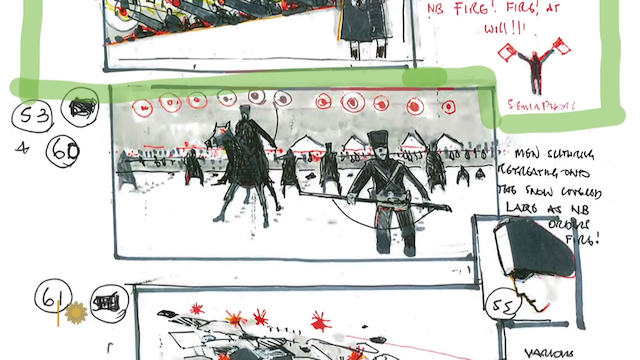It may seem anachronistic to still be storyboarding by hand, but in the recent CBS News interview excerpted below, Director Ridley Scott shows the multifaceted benefits of storyboards (and by extension, other types of design sketches) that carry through to the bottom line.
Here’s a Ridley Scott storyboard sample from his latest movie, Napoleon:

Based on the contents of this clip, it’s apparent that storyboarding helps in multiple parts of the production:
- It provides a foundation for the core creative team’s visualization of the story. Scott has a vision for his creation, manifested in the drawings he made himself, thinking through the scenes he wants to include to tell Napoleon’s story.
- The storyboard lets the production team better understand the technical and human requirements for the film.
- The business gatekeepers can not only understand what the creative team is trying to achieve, but how it needs to be budgeted.
In the interview, Scott said storyboards convinced the finance group double the production budget.
Let that sink in: A series of rough illustrations were instrumental in convincing Hollywood bean counters to add tens of millions of dollars to the budget. It let them feel the creator’s vision, understand the requirements to realize it, and get them to “yes” faster.
For readers of my book Lean Media, the storyboard approach ticks many of the boxes for the Lean Media framework, from focusing creativity to reducing waste. Importantly, storyboarding (or sketching, wireframing, or other types of design prototypes) gets everyone on both the creative and business teams on the same page. Instead of the money people telling the creative core what they can’t do, it helps them realize what the team is striving for.
Quoting Kevin J. Walsh, one of the producers for Napoleon who also worked on Manchester By The Sea:
So many movies are poorly made, because an original voice with an original idea is watered down by a bunch of opinions. That’s how you get a bad movie.
Check out the CBS interview below, which includes more storyboard samples from other Ridley Scott films including Alien and Gladiator.
